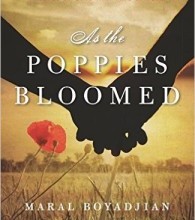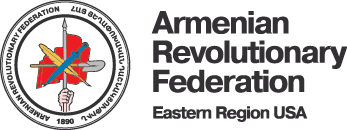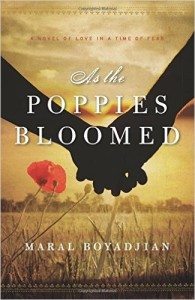Author of ‘As the Poppies Bloomed’ to Discuss Book in Boston

ARLINGTON, Mass.—Among countless books published on the Armenian Genocide, a number of fictionalized accounts have appeared over the years that provide a different perspective on the human experience, through stories of resilience, perseverance, and survival. On Fri., April 15, at 7 p.m., the Boston community will have the opportunity to meet and discuss an exceptionally fascinating narrative with Maral Boyadjian, the author of As the Poppies Bloomed. The event is co-sponsored by the Armenian Cultural Foundation (ACF), the Amaras Art Alliance, and the Armenian Women’s International Association (AWIA). Also participating in the event is Salpi Ghazarian, the director of the Institute of Armenian Studies at the University of Southern California.
As the Poppies Bloomed is a fictionalized account of her family’s experience during the Armenian Genocide, which decimated the families of all four of the author’s grandparents. That is perhaps why this lovingly written and sometimes lyrical account of the events in the small village of Salor seems so real—at times the characters almost jump off the page at the reader. At other times, the narrative has the feel of a folk tale. The careful attention to anthropological details, such as village traditions or the shapes and materials of rugs, plates, and all manner of daily utensils, is unique as well: “Today, Anno would join the other woman and children of different households to winnow the grain. The wheat would be lain thinly on large, clean cloths and hit with sticks to separate it from the husks. Then, with shovels, they would toss the grain and chaff into the air so that the chaff would fly off and the grain fall neatly to the cloth.”
Although the book does not carry quite the stylistic or philosophical weight of Raffi’s Fool, a classic written in Armenian, at times it may remind one of that masterpiece as one reads through to its inevitable conclusion.
It’s 1913 when the book opens in the Kars region in the small village of Salor. The Armenians have already been thinned out after the 1896 massacres led by Adbul Hamid and by the constant raids by Kurds and Turks alike. As the indigenous people of Western Armenia/Anatolia and the most industrious people there along with the Greeks, the Armenians are ill-prepared to defend themselves. As Christians in a Muslim land, they cannot bear arms except on wedding days, and so they must resort to hiding a musket here, a hand gun there. It is little comfort or defense against the Ottoman Army. “[A]s one fedayee or freedom fighter observes, ‘How will a tiny band of men such as ourselves, with nothing but the guns we can smuggle, protect our people from the whole Turkish army?’” The obvious answer is that they can’t; hence, the tragedy that is about to befall the village is doubly alarming.
As the Poppies Bloom is a love story as well. As the story opens, 15-year-old Anno hides in a well where she has agreed to a rendezvous with her young lover Daron. In an age where unions are arranged and families marry off their children to other families that they are close to, it seems their wedding may never happen. It is against this backdrop that perhaps the most important message in Boyadjian’s novel emerges: that despite all odds and the most hideous persecutions, love may yet win out, and that the descendants of these brave mountain people will somehow manage to survive the most terrible massacres that history has yet visited on their ethnic group. As the story unfolds, the villagers of Salor try to organize a defense against the Ottoman Army. Some of the protagonists survive, others do not.
Poppies is a story of love, loss, and in the end salvation—the best type of story to remind ourselves of some of the worst, and best, aspects of the human condition.
Maral Boyadjian, a former preschool director and a partner in her husband’s successful construction business, explains the purpose behind her writing of her book as “to write the kind of book I would want to read, where the characters live and breathe and stay with me long after the last page has been turned.” As the Poppies Bloomed has received favorable reviews from various sources, including Kirkus Reviews, which called it “powerful and sensitive.”
The April 15 event begins at 7 p.m. at the ACF, 441 Mystic St (Rte. 3), in Arlington, with a reception followed by a conversation and discussion with the author. Copies of the book will also be available for sale.
Source: Armenian Weekly Mid-West

